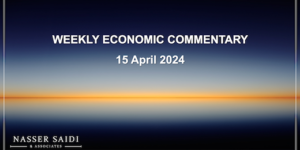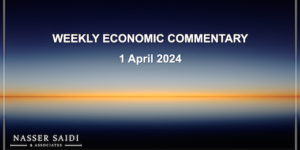Markets
Equity markets continued to be troubled by weak data, Greece’s debt worries and recent unrest over proposed austerity measures. Regional markets were mostly down, with the exception of UAE where traders are speculating a possible upgrade to emerging market status by the MSCI later this week. Euro continues to decline and yen slumped to a two-week low against the dollar. Oil prices declined; gold prices recovered on Friday after recording a sharp 1% decline last Monday.
Global Developments
Americas:
- US retail sales declined -0.2% mom in May vs. median forecast -0.5%. Ex-autos sales increased 0.3% mom, vs. median forecast +0.2%.
- May PPI inflation increased by 0.2% mom, a steep decline from Apr’s 0.8%. Lower food prices (-1.4%) were offset by energy prices rises (+1.5%). Core producer prices rose in line with expectations, up 0.2%.
- May industrial production rose 0.1% mom, following no change in April, with factory output rising by 0.4%, led by a 1.2% jump in production of business equipment.
- US inflation recorded a 0.2% mom increase in May while core inflation rose 0.3%, recording the fastest monthly increase since July ‘08.
- Homebuilders survey for June showed a slump in confidence to 13 (May:16) recording the biggest drop in a year, to the lowest level in nine months as the sales outlook continued to drag down sentiment.
- Housing starts rose 3.5% mom to a 560k-unit pace in May while building permits, a forward-looking indicator, jumped 8.7% to a rate of 612k.
Europe:
- UK inflation remained at a 30 month high of 4.5% yoy (0.2% mom) in May due to high food prices. The BoE expects a further rise to 5% later in 2011.
- Eurozone’s Apr industrial production rose by 0.2% mom (Mar: unchg), driven by the 1.3% rise in production of durable consumer goods; capital goods and intermediate goods rose by only 0.5% and 0.1%.
- Eurozone inflation clocked in 2.7% yoy for the month of May with the components transport (5.3%), housing (4.7%) and alcohol & tobacco (3.3%) rising the most.
- Moody’s has put Italy’s Aa2 rating under review over concerns about its ability to reduce public debt. This follows the move by S&P, which cut its rating outlook for Italy’s debt from stable to negative.
- Russian Q1 GDP rose 4.1% yoy. Services and agriculture were perky, while wholesale/retail, construction and public services contributed negatively.
Asia and Pacific:
- China tightened reserve requirements to 21.5% for larger banks, for the ninth time since last October.
- China’s inflation hit an almost 3 year record at 5.5% yoy in May (Apr: 5.3%), as higher food prices are influencing other CPI components.
- The Reserve Bank of India raised both its repo and reverse repo rates by 25bps to 7.5% and 6.5% respectively, following last week’s announcement of May inflation at 9.05%.
- The Philippines central bank left its benchmark policy rates unchanged at 4.5% (a 2-year high) while hiking the banks’ reserve requirement by one percentage point.
- Chinese industrial production growth slowed in May to 13.3% yoy (in line with consensus: 13.1%; Apr: 13.4%). But its sequential growth rose to 2.7% mom s.a. annualised in May, up from Apr’s -9.2% s.a ann.
- Japan machinery orders posted an unexpected 3.3% mom drop as orders for general machinery fell 15% and electronic machinery orders, which also include nuclear technology, fell 17.2%.
Bottom line:
This week’s data did not alter the overall outlook of a softening in world growth: the US is poised for a growth around 2.5% annualized in Q2. The OECD composite leading indicators shows that the world’s largest economies are set to expand at a more moderate pace in the months ahead, with Brazil, India, France and Italy facing below-trend growth. China’s policy makers are trying to pull out a soft landing in the economy, but on the price front the efforts are not yet successful as the 4% inflation target for 2011 seems out of reach. The default of Greece remains in the background as the catalyst for a new sudden credit freeze like in the Fall of 2008.
Regional Developments
- GCC Financial Market Committee approved unified rules governing shares, bonds, sukuks and investment funds listed in the GCC financial markets. However, the unified rule is non-mandatory for two years and hence likely to be implemented fully only from 2013.
- Goods handled in Saudi ports rose 4.45% to reach 35.07 at annual rate in 1Q2011 according to recent statistics release by Saudi ports authority.
- Algosaibi dropped its defence against claims (worth USD 250 million) from five banks (among which HSBC and Credit Agricole) linked to a high-profile $22 billion family feud over the collapse of their financial empire, which has cast a negative light on family conglomerates in the GCC.
- Omantel agreed with three international telecom partners — Iran, the UK and Russia — to provide a new express cable system that will ultimately link Frankfurt in to the Gulf.
- The HSBC GCC Business Confidence Index in Q2 gained a paltry 1.7 points compared to Q1.
UAE Focus
- The Government of Dubai returned to the market after its previous issue in Oct 2010, raising USD 500mn from the sale of ten-year bonds, with a five-year put option.
- UAE’s benchmark three-month interbank offered rate was set at 1.633% on Monday, the lowest level since June 2004, as the unrest in the region led to increased liquidity coming into the country, also improving the interbank dirham liquidity.
- Recent release of UAE central bank balance sheet displays deposits with foreign banks doubled to reach AED 88bn during the first four months of 2011 while domestic deposits with central bank rose 25% mom to reach AED 83.3bn, investment rose 4.5% to AED 183bn, taking total assets to highest level at AED 277bn by the end of April 2011.
- Nakheel is close to complete its debt-restructuring deal as it secured a nearly consensus approval (98%) from its financing banks.
- Fund managers expressed concerns over the new fund regulation draft giving SCA control over the UAE’s fund management industry from the central bank. The funds view the new regulations as unduly favouring banks. The regulation will not apply to funds domiciled in the Dubai International Financial Centre.
- UAE is supporting the new French candidate, French Minister of Finance Mrs. Christine Lagarde, for IMF head position. This was announced by Obaid Humaid Al Tayer, Minister of State for Financial Affairs.
- The World Bank is in consultation with Dubai government regarding the establishment pensions scheme for expatriates (Source: The National)
- Abu Dhabi government has allocated AED 7bn for Emirati housing mortgage program.
- UAE central bank is consulting banks about launching a deposit insurance scheme; the proposal mentions insuring deposits less than AED 1.5bn through the establishment of a deposit guarantee institution.
- Boeing estimated in its recent World Air Cargo Forecast release, biennial assessment of the air cargo industry, that Dubai acquired 70% of Middle East air cargo, thanks to its state of the art logistic infrastructures and open sky policy.
- Dubai Economic Department licenses rose 3% in first five months of 2011 to reach a total of 190,000.
- Abu Dhabi’s inflation rate rose 2.1% at annual rate in May 2011, led by a surge in food prices (7.7%).
- Dubai health authority announced that a health insurance system is about to be launched.





